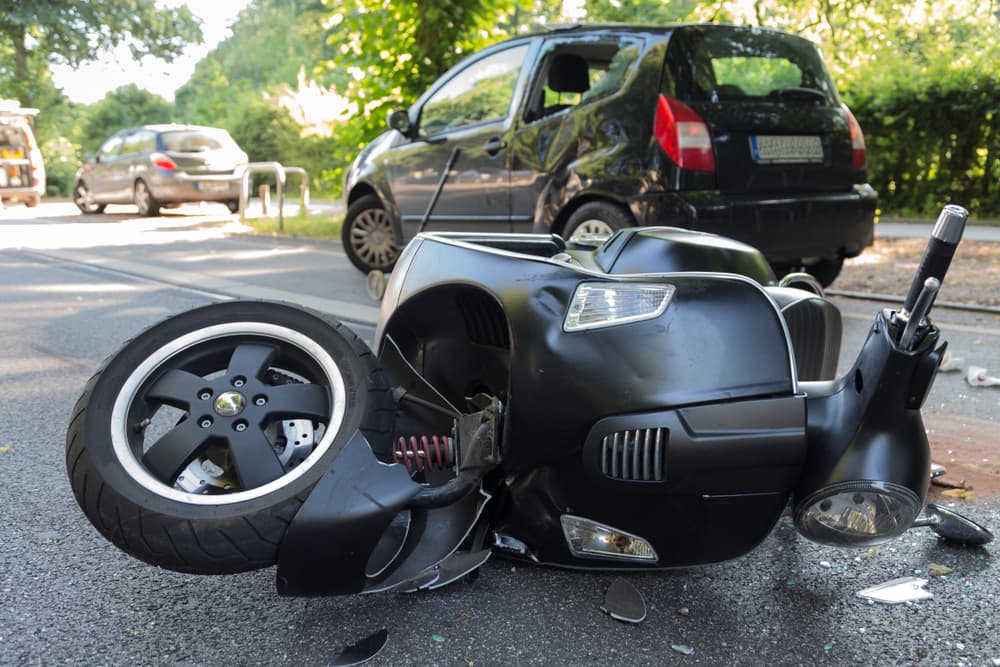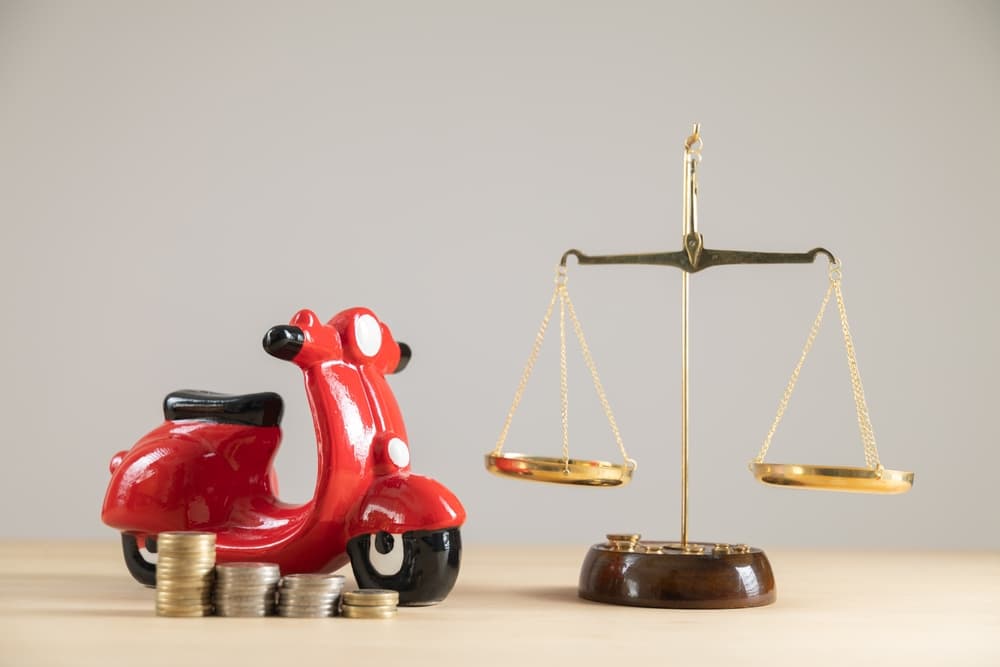Motorcycle accidents frequently happen when other drivers violate traffic laws, fail to watch the road attentively, or exhibit road rage. However, to deny or undervalue a claim, some insurance company adjusters may argue that the motorcycle rider caused or contributed to the accident. In this situation, you need experienced legal counsel fighting for you.
A knowledgeable motorcycle accident lawyer can fight the insurance company on your behalf and aggressively pursue the compensation you deserve. Moreover, if the insurance company adjuster fails to offer a reasonable settlement, your lawyer can file a lawsuit and pursue a favorable litigation result in court.
Common Causes of Motorcycle Crashes

Motorcycle collisions can often be traced back to the negligence of other drivers or road users.
When others violate standard road rules or fail to watch the road attentively, they may inadvertently cause an accident with a motorcycle, causing serious injuries.
- One common type of negligence is distracted driving, which occurs when a driver diverts their attention from the road, whether to text, check their phone, or engage in conversations with passengers. Such distractions can prevent drivers from noticing motorcycles, leading to collisions that can cause serious injuries or fatalities.
- Another significant factor is speeding. Drivers who exceed the speed limit or drive too fast for road conditions may lose control of their vehicles. A speeding driver may fail to react in time to avoid a collision, putting the motorcyclist at a severe disadvantage due to their smaller size and fewer protections.
- Driving while under the influence of alcohol or drugs can result in devastating collisions. Impaired drivers often have slowed reaction times, poor judgment, and diminished coordination, making it more likely that they will overlook a motorcyclist or misjudge the distance needed to stop safely.
- Poor road conditions also contribute to motorcycle crashes. Local authorities’ negligence can include failing to maintain roadways, leaving potholes, or neglecting to remove debris. Such hazards can endanger motorcyclists, who rely on stable surfaces for balance and control.
- Furthermore, negligent driving behaviors, such as failing to yield the right-of-way or running red lights, can result in catastrophic collisions with motorcycles. When drivers disregard traffic signals or do not allow motorcyclists to merge safely, the crash risk increases significantly.
- Inadequate training of commercial drivers (including truck drivers) can also lead to motorcycle collisions. Truck drivers, for instance, may not be fully aware of their blind spots or the limitations of their vehicles when sharing the road with motorcycles. This lack of awareness can lead to unsafe lane changes or sudden stops that can jeopardize the safety of motorcyclists.
Common Motorcycle Accident Injuries
Motorcycle accidents can lead to a wide range of injuries, significantly affecting riders’ lives. Due to motorcyclists’ inherent vulnerability compared to drivers of larger vehicles, injuries can be severe and life-altering. The following are some of the most common types of physical and mental injuries that riders may suffer due to another driver’s negligence.
Physical Injuries:
- Head Injuries – Head injuries are among the most severe injuries sustained in motorcycle collisions. Even with a helmet, riders can suffer concussions or traumatic brain injuries (TBIs). These injuries can lead to long-term cognitive issues, memory loss, and difficulties in everyday functioning.
- Road Rash – This common injury occurs when a rider’s skin scrapes against the pavement during a crash. Road rash can range from abrasions to deep lacerations, potentially requiring skin grafts or extensive medical treatment.
- Fractures – Motorcyclists are prone to various fractures, particularly in the arms, legs, and collarbone. A sudden impact can cause bones to break, leading to long recovery times, physical therapy, and sometimes permanent disability.
- Spinal Cord Injuries – Accidents can result in serious spinal cord injuries, which can result in paralysis or loss of mobility. Depending on the severity and location of the injury, victims may experience chronic pain or require extensive rehabilitation.
- Internal Injuries – Blunt force trauma from a collision can damage internal organs, leading to life-threatening conditions. Internal bleeding, ruptured organs, and other serious complications may require immediate medical intervention.
Mental Injuries:
- Post-traumatic Stress Disorder (PTSD) – After a traumatic crash, many riders develop PTSD. Symptoms may include flashbacks, anxiety, nightmares, and avoidance of reminders related to the crash. PTSD can significantly impair a person’s daily life and relationships.
- Depression and Anxiety – A motorcycle accident can lead to emotional struggles. Riders may experience feelings of hopelessness, anxiety about riding again, or general emotional distress related to their injuries and the effects on their lifestyle.
Common Damages in Motorcycle Accident Claims

When motorcycle riders are in crashes due to negligent drivers, they may recover damages or compensation:
- Lost income – A collision may prevent riders from working. Compensation for lost earnings covers the income they miss during their recovery time. If severe injuries affect their ability to work long-term or permanently, they may seek compensation for loss of earning capacity as well.
- Pain and Suffering – This compensation addresses the physical pain and emotional distress the accident caused. Riders often experience ongoing discomfort, chronic pain, and mental anguish following an accident. Compensation for pain and suffering aims to recognize the repercussions of these injuries on the rider’s quality of life, including how their injuries affect their daily activities and overall well-being.
- Loss of Consortium – This compensation category refers to the consequences an injury has on the victim’s relationship with their spouse or partner. This type of damage recognizes the emotional and relational toll the crash takes on the victim’s loved ones.
- Emotional Distress – Collisions can lead to significant emotional and psychological challenges. Victims may experience anxiety, depression, or PTSD as a result of their experiences. Compensation for emotional distress seeks to address the mental anguish and emotional pain that riders endure following an accident.
- Loss of Enjoyment of Life – If injuries prevent a rider from participating in activities they once enjoyed, such as hobbies, sports, or social events, they may recover compensation for loss of enjoyment of life. This compensation recognizes that serious injuries can diminish the overall quality of life and limit a person’s ability to enjoy previously fulfilling experiences.
An experienced motorcycle accident lawyer can pursue these damages for you, helping you become whole again after your accident.
Reasons Why Insurance Companies May Wrongfully Blame a Motorcyclist for Their Accident
Insurance companies may wrongfully blame a motorcyclist for their accident to reduce or deny the amount of compensation they have to pay. Since motorcycles are often seen as more dangerous than cars, insurance companies may use this perception to their advantage, claiming that the rider was reckless.
For example, they may argue that the motorcyclist broke the speed limit, weaved through traffic, or failed to follow traffic laws – even if no clear evidence supports these claims.
Motorcyclists are also more vulnerable to road hazards than drivers of larger vehicles. Potholes, debris, or uneven pavement can endanger a motorcyclist, and an insurance company may argue that the rider should have anticipated these obstacles or driven more safely. This unfairly shifts the blame to the motorcyclist, even though these hazards often pose unavoidable risks.
Insurance companies may also argue that the motorcyclist wasn’t wearing the proper protective gear, such as a helmet or bright clothing, and use that as evidence that the rider was irresponsible. They may claim that if the motorcyclist had worn the right gear, the accident would have injured them less, implying that the motorcyclist contributed to their own harm.
Ultimately, insurance companies are big businesses, and their primary goal is to pay out as little money as possible to injured motorcycle accident victims. By wrongfully blaming the motorcyclist, they can try to reduce their financial responsibility, knowing that public perception may be biased against motorcyclists.
Therefore, riders need strong legal representation to counter these unfair tactics and protect their rights.
If an insurance company adjuster wrongfully blamed you for your crash, a skilled motorcycle accident lawyer can review your accident (including the police report) and determine your legal options. If necessary, your lawyer can file a lawsuit and take your case to trial to pursue a favorable case resolution.
Fighting the Insurance Company in a Motorcycle Accident Claim or Lawsuit

A knowledgeable motorcycle accident lawyer can play a valuable role in advocating for victims and ensuring they receive the compensation they deserve.
Insurance companies often attempt to minimize payouts or deny claims altogether. However, an experienced lawyer knows how to counter these tactics effectively.
The following are several ways a motorcycle accident lawyer can fight the insurance company on your behalf.
- Thorough Investigation – A proficient lawyer will conduct a comprehensive investigation into the collision, including gathering evidence such as police reports, witness statements, photographs of the scene, and medical records. By collecting all relevant information, the lawyer can build a strong case that clearly outlines the circumstances of the crash and demonstrates the liability of the negligent driver.
- Establishing Liability – Demonstrating who is at fault in a motorcycle collision is vital for a successful claim. A lawyer can analyze the accident to establish liability, which may involve reviewing traffic laws, consulting accident reconstruction experts, and interviewing witnesses. By effectively proving the other driver’s negligence, the lawyer strengthens your case against the insurance company.
- Calculating Fair Compensation – Many victims underestimate the full extent of their damages. A skilled lawyer can accurately assess all the financial and non-financial losses resulting from the collision, including not only lost income and loss of earning capacity but also pain and suffering, emotional distress, and loss of life enjoyment. By presenting a comprehensive picture of the damages, the lawyer ensures that the insurance company cannot dismiss your claim or offer you an unfair settlement.
- Negotiating with Insurance Adjusters – Insurance adjusters are trained to minimize payouts, often using tactics to pressure victims into accepting low settlements. A motorcycle accident lawyer knows how to negotiate with these adjusters effectively. They can counter lowball offers and advocate for a fair settlement based on the evidence and calculated damages.
- Litigation Support – If the insurance company refuses to settle the claim fairly, a skilled motorcycle accident lawyer can take your case to court. They will prepare all necessary documents, present evidence, and argue your case before a judge or jury. Having a lawyer willing to go to trial can motivate the insurance company to offer a fair settlement out of court.
- Providing Legal Guidance – Navigating the legal system can be complex and overwhelming, especially for accident victims. An experienced lawyer will provide guidance throughout the process, explaining your rights, options, and what to expect at each stage. This support can alleviate the stress and uncertainty often associated with pursuing a claim.
A skilled motorcycle accident lawyer can effectively fight the insurance company through investigation, establishing liability, calculating fair compensation, negotiating settlements, providing litigation support, and offering legal guidance. Their skill ensures that victims can focus on recovery while pursuing the fair compensation they deserve.
Contact a Skilled Motorcycle Accident Lawyer Right Away
If the insurance company is disputing fault for your motorcycle crash or undervaluing your claim, you need experienced legal help in your corner right away. A knowledgeable personal injury lawyer can fight the insurance company for the compensation you deserve. Specifically, they can aggressively negotiate a settlement or, if necessary, pursue a favorable litigation result in the court system.
A motorcycle accident lawyer will know how to handle the legal process and advocate on your behalf while you recover from the accident. Don’t delay, call today.
